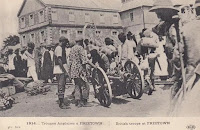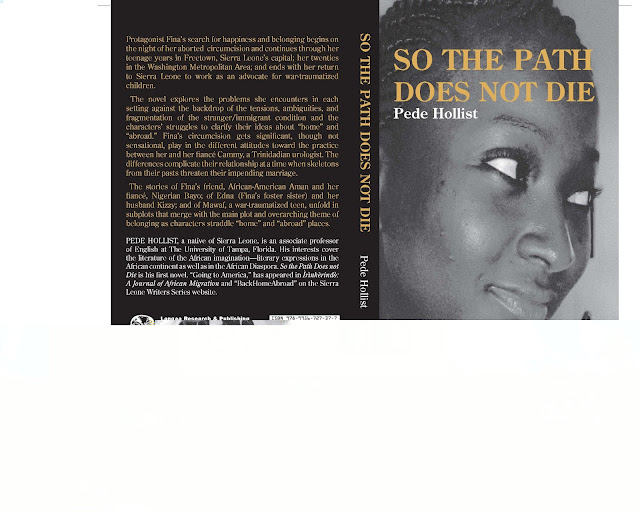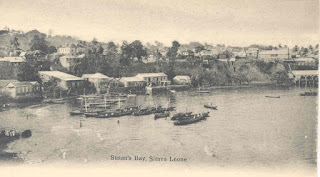Ofeibea Quist-Arcton on Queen Pokou
When Favorite Books Of 2010 asked NPR personalities to write about one book from the past year that they loved, Ofeibea Quist-Arcton , an NPR foreign correspondent who covers West Africa, chose Queen Pokou.
The reason she said was that Reine Pokou — translated in English as Queen Pokou: Concerto for a Sacrifice-- is an attractive, slim volume of poetic prose, with a colorful cover illustration by the author, about an African queen from a country that is back in the headlines — Ivory Coast.
Quist-Arcton also said another reason we should grab this book and read it was because Veronique Tadjo , who is Ivorian-French, was weaned on the legend of Queen Pokou.
Quist-Arcton told Favorite Books she had
In case you you haven't heard by now, here's a pretty good summary of the 2010 Ivorian Election on Wikipedia
As I write, Gbagbo is staging a bloody fightback in Ivory Coast and violence continues as the former president refuses to concede defeat.
Reports in an April 8 NPR story Ivory Coast: More Ethnic Murders say:
UN investigators have found more than 100 bodies in Ivory Coast. Ofeibea Quist-Arcton tells NPR Newscasts some of the victims were burned alive and other people were flung down wells. The UN believes the murderers are mercenaries from Liberia, just across the Ivorian border. It's not clear if they support intransigent leader Laurent Gbagbo or Alassane Ouattara, the internationally recognized winner of Ivory Coast's presidential election.
The reason she said was that Reine Pokou — translated in English as Queen Pokou: Concerto for a Sacrifice-- is an attractive, slim volume of poetic prose, with a colorful cover illustration by the author, about an African queen from a country that is back in the headlines — Ivory Coast.
Quist-Arcton also said another reason we should grab this book and read it was because Veronique Tadjo , who is Ivorian-French, was weaned on the legend of Queen Pokou.
She has presented us with evocative and captivating stories — ancient tales based on historical fact and fable — that reach right into the soul and pull at your heartstrings.
Quist-Arcton told Favorite Books she had
picked up Reine Pokou (the 2009 English translation of a book I devoured when it was first published in French and won the prestigious 2005 Grand Prix Litteraire d’Afrique Noire) as she headed to Ivory Coast to cover the Nov. 28th presidential runoff vote. At the time, Ivory Coast was struggling to emerge from a decade of political upheaval, rebellion and civil war. The election was meant to draw a line under ten years of troubles.
In case you you haven't heard by now, here's a pretty good summary of the 2010 Ivorian Election on Wikipedia
The presidential elections that should have been organized in 2005 were postponed until November 2010. The preliminary results announced by the Electoral Commission showed a loss for Gbagbo in favour of his rival, former prime minister Alassane Ouattara. The ruling FPI contested the results before the Constitutional Council, charging massive fraud in the northern departments controlled by the rebels of the Forces Nouvelles de Côte d'Ivoire (FNCI). These charges were contradicted by international observers. The report of the results led to severe tension and violent incidents.
The Constitutional Council, which consists of Gbagbo supporters, declared the results of seven northern departments unlawful and that Gbagbo had won the elections with 51% of the vote (instead of Ouattara winning with 54%, as reported by the Electoral Commission). After the inauguration of Gbagbo, Ouattara, recognized as the winner by most countries and the United Nations, organized an alternative inauguration.
These events raised fears of a resurgence of the civil war; thousands of refugees have fled the country. The African Union sent Thabo Mbeki, former President of South Africa, to mediate the conflict. The UN Security Council adopted a common resolution recognising Alassane Ouattara as winner of the elections, based on the position of ECOWAS (Economic Community of West Africa States). ECOWAS suspended Côte d'Ivoire from all its decision-making bodies while the African Union also suspended the country's membership.
As I write, Gbagbo is staging a bloody fightback in Ivory Coast and violence continues as the former president refuses to concede defeat.
Reports in an April 8 NPR story Ivory Coast: More Ethnic Murders say:
UN investigators have found more than 100 bodies in Ivory Coast. Ofeibea Quist-Arcton tells NPR Newscasts some of the victims were burned alive and other people were flung down wells. The UN believes the murderers are mercenaries from Liberia, just across the Ivorian border. It's not clear if they support intransigent leader Laurent Gbagbo or Alassane Ouattara, the internationally recognized winner of Ivory Coast's presidential election.



Comments
Post a Comment